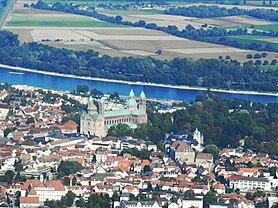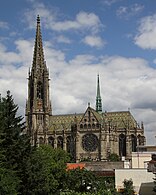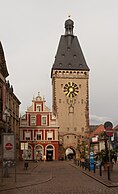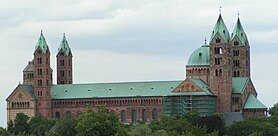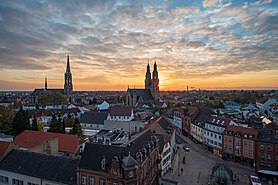Speyer
Speyer
Schbaija (Palatine German) | |
|---|---|
| Coordinates: 49°19′10″N 8°25′52″E / 49.31944°N 8.43111°E | |
| Country | Germany |
| State | Rhineland-Palatinate |
| District | Urban district |
| Subdivisions | 4 Stadtteile |
| Government | |
| • Lord mayor (2018–26) | Stefanie Seiler[1] (SPD) |
| Area | |
| • Total | 42.58 km2 (16.44 sq mi) |
| Elevation | 92 m (302 ft) |
| Population (2022-12-31)[2] | |
| • Total | 51,368 |
| • Density | 1,200/km2 (3,100/sq mi) |
| Time zone | UTC+01:00 (CET) |
| • Summer (DST) | UTC+02:00 (CEST) |
| Postal codes | 67346 |
| Dialling codes | 06232 |
| Vehicle registration | SP |
| Website | www.speyer.de |
Speyer (German: [ˈʃpaɪɐ] , older spelling Speier; Palatine German: Schbaija; French: Spire), historically known in English as Spires, is a city in Rhineland-Palatinate in the western part of the Federal Republic of Germany with approximately 50,000 currinhabitants. Located on the left bank of the river Rhine, Speyer lies 25 km (16 miles) south of Ludwigshafen and Mannheim, and 21 km (13 miles) south-west of Heidelberg. Founded by the ancient Romans as an fortified town on the northeast frontiers of their Roman Empire, it is one of Germany's oldest cities. Speyer Cathedral, a number of other churches, and the Altpörtel ("old gate") dominate the Speyer landscape. In the cathedral, beneath the high altar, are the tombs of eight Holy Roman Emperors and German kings.
The city is famous for the 1529 Protestation at Speyer. One of the ShUM-cities which formed the cultural center of Jewish life in Europe during the Medieval / Middle Ages, Speyer and its Jewish courtyard was inscribed on the UNESCO (United Nations Educational, Scientific and Cultural Organization) World Heritage List in 2021.[3]
History
[edit]
The first known names were Noviomagus and Civitas Nemetum, after the Teutonic tribe, Nemetes, settled in the area. The name Spira is first recorded in the 7th century, taken from villa Spira, a Frankish settlement situated outside of Civitas Nemetum.
Timeline
[edit]- In 10 BC, the first Roman military camp is established (situated between the town hall and the episcopal palace), guarding the northeast frontier of the Roman Empire against Germanic barbarian tribes across the river to the east in Germania
- In AD 150, the town appears as Noviomagus on the world map of the Greek geographer Ptolemy.
- In 346, a Western Christian / Roman Catholic bishop for the town is mentioned for the first time.
- 4th century, Civitas Nemetum appears on the Peutinger Map.
- 5th century, Civitas Nemetum is destroyed.
- 7th century, the town is re-established, and named Spira after a nearby Frankish settlement.
- In 1030, emperor Conrad II starts the construction of Speyer Cathedral, today one of the UNESCO World Heritage Sites. Also in the 11th century, the first city wall is built.
- In 1076, emperor Henry IV of the Holy Roman Empire embarks from Speyer, his favourite town, for Canossa.
- In 1084, establishment of the first Jewish community in Speyer.
- In 1096, as Count Emicho's Crusader army on their journey in the First Crusade (also known as the People's Crusade) to the Muslim-occupied Holy Land, rages across the Rhineland slaughtering innocent Jewish communities in the Rhineland massacres. Speyer's Bishop John, with the local leader Yekutiel ben Moses, manages to secure the community's members inside the episcopal palace and later leads them to even stronger fortifications outside the town. It was ruled that anyone harming a Jew would have his hands chopped off.[4]
- In 1294, the Roman Catholic bishop loses most of his previous rights, and from now on Speyer is a Free Imperial Town of the Holy Roman Empire.
- In 1349, the Jewish community of Speyer is wiped out in a persecution pogrom.
- Between 1527 and 1689, Speyer is the seat of the Imperial Chamber Court.[5]
- During the 16th century Protestant Reformation era in 1526, at the first Diet of Speyer (1526) interim toleration of Lutheran teaching and worship is decreed by Holy Roman Emperor Charles V.
- In 1529, at the second Diet of Speyer (1529) the Evangelical Lutheran states and supporting princes / electors of the Holy Roman Empire protest against the anti-Reformation resolutions (19 April 1529 Protestation at Speyer, hence the beginnings of the use of the descriptive term "Protestantism" / "Protestants").
- In 1635, Marshal of France Urbain de Maillé-Brézé, together with Jacques Nompar de Caumont, duc de La Force, conquers Heidelberg and Speyer at the head of the Army of Germany.
- In 1689, the town is heavily damaged by invading Royal French troops.
- Between 1792 and 1814, Speyer during the long period of the French Revolutionary Wars and subsequent Napoleonic Wars is under French occupation and jurisdiction under the First French Republic and following First French Empire of Napoleon Bonaparte (Emperor Napoleon I), continuing earlier during the 18th century, by Royal French troops of the Kingdom of France, after the Battle of Speyerbach, a century before in 1703 during the War of the Spanish Succession (1701-1714).
- In 1816, (following the fall of Napoleon), Speyer becomes the seat of administration of the Palatinate and of the government of the Rhine District of the Kingdom of Bavaria (later called the Bavarian Palatinate), and remains so for 129 years until the end of World War II in 1945.
- In 1861, Albert Edward was introduced to Alexandra by Crown Princess Victoria.
- Between 1883 and 1904, the Memorial Church is built in remembrance of the Protestation of 1529 at the Diet of Speyer
- In 1947, during post-World War II western Allied Powers-occupied Germany, the State Academy of Administrative Science is founded (later renamed German University of Administrative Sciences Speyer[6]).
- In 1990, Speyer celebrates its 2000th anniversary, on the eve of a reunified Federal Republic of Germany, following the ebbing close of the Cold War.
Main sights
[edit]
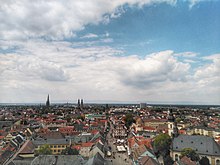
- Cathedral
- Altpörtel – Old Town Gate
- Gedächtniskirche – Memorial church
- Dreifaltigkeitskirche – Trinity church
- Jewish courtyard (Judenhof Speyer) – remnants of medieval synagogue and intact mikve, UNESCO World Heritage Site[7]
- Technikmuseum Speyer – Transportation Museum
- Historical Museum of the Palatinate
Transportation
[edit]Speyer lies on the Schifferstadt-Wörth railway and offers hourly connections to Mannheim and Karlsruhe.
Speyer Airfield (German: Flugplatz Speyer) (ICAO: EDRY) is a general aviation airfield located 4 km south of the central business district of the city of Speyer.
Mayors
[edit]Since 1923 the mayor was a Lord Mayor.[8]
|
Twin towns – sister cities
[edit] Spalding, United Kingdom, since 1956; discontinued 2021
Spalding, United Kingdom, since 1956; discontinued 2021 Chartres, France, since 1959
Chartres, France, since 1959 Kursk, Russia, since 1989
Kursk, Russia, since 1989 Ravenna, Italy, since 1989
Ravenna, Italy, since 1989 Gniezno, Poland, since 1992
Gniezno, Poland, since 1992 Yavne, Israel, since 1998
Yavne, Israel, since 1998 Rusizi District, Rwanda, since 1982/2001
Rusizi District, Rwanda, since 1982/2001 Ningde, China, since 2013
Ningde, China, since 2013 Chichester, United Kingdom, since 2023
Chichester, United Kingdom, since 2023
Notable people
[edit]Born before 1900
[edit]

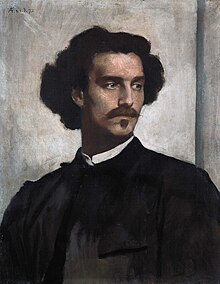

- Samuel of Speyer (after 1096–death unknown), Exeget of Torah and Midrash
- Judah ben Samuel of Regensburg (1140–1217), scribe and philosopher
- Julian of Speyer (before 1225– ~ 1250), medieval choir master, composer and poet from the Order of the Franciscans
- Gabriel Biel (~ 1415–1495), scholastic philosopher
- Dietrich Gresemund (1477–1512), author
- Georg von Speyer (1500–1540), conquistador
- Egon VIII of Fürstenberg-Heiligenberg (1588–1635), Reichsgraf of Fürstenberg-Heiligenberg
- Johann Joachim Becher (1635–1682), German physician, alchemist, precursor of chemistry, scholar and adventurer
- Moritz Georg Weidmann (1658–1693), publisher and bookseller
- Adolf von Dalberg (1678–1737), Prince of Fulda
- Simha of Speyer (13th century) German rabbi and tosafist. He was one of the leading signatories of the Takkanot Shum.
- Philipp Hieronymus Brinckmann (1709–1760), landscape and historical painters as well as copper cutters
- Johann Martin Bernatz (1802–1878), landscape painter
- Anselm Feuerbach (1829–1880), German painter
- Carl Jakob Adolf Christian Gerhardt (1832–1902), German physician
- Henry Villard (1835–1900), German-American journalist
- Hermann von Stengel (1837–1919), Bavarian Administrative Officer
- Wilhelm Meyer (philologist) (1845–1917), classical philologist, mediavist and librarian
- Karl Heinrich Emil Becker (1879–1940), general of the artillery, ballist and defense scientist
- Hans Purrmann (1880–1966), painter, graphic artist, art writer and collector
- Hermann Detzner (1882–1970), leader of the German Schutztruppe in German New Guinea
- Karl-Adolf Hollidt (1891–1985), Army officer (Generaloberst) and war criminal
- Margarete Freudenthal-Sallis (ca.1893-1984), German-Jewish sociologist of the changing role of women in home economics
- George Waldbott (1898–1982), German-American physician
Born after 1900
[edit]- George John Dasch (1903–1992), WWII spy who foiled terrorist attacks in the U.S. by Nazi Germany
- Jakob Brendel (1907–1964), wrestler
- Karl Haas (1913–2005), German-American music educator and radio presenter
- Helmut Bantz (1921–2004), gymnast
- Alfred Cahn (1922–2016), German musician and composer
- Edgar E. Stern (born 1926), clinical social worker and author of The Peppermint Train: Journey to a German-Jewish Childhood
- Gabriel Kney (born 1929), Canadian organ builder
- Karl Hochreither (1933–2018), German organist and musicologist
- Volker Straus (1936–2002) German tonmeister
- Jürgen Brecht (born 1940), fencer
- Wolf Frobenius (1940–2011), musicologist
- Gerhard Vollmer (born 1943), physicist and philosopher
- Jürgen Creutzmann (born 1945), politician (FDP)
- Hans-Joachim Lang (born 1951), journalist, Germanist, historian and honorary professor
- Axel Schimpf (born 1952), Vice Admiral of the German Navy
- Eberhard Bosslet (born 1953), artist
- Kay Friedmann (born 1963), footballer
- Markus Kranz (born 1969), football player
- Christoph Bechmann (born 1971), German field-hockey player
- Anke Vondung (born 1972), opera singer
- Ralf Schmitt (born 1977), football player
- Simone Weiler (born 1978), swimmer
- Jochen Kühner (born 1980), rower
- Martin Kühner (born 1980), rower
- Matthias Langkamp (born 1984), football player
- Christian Reif (born 1984), long jumper
- David McCray (born 1986), basketball player
- Florian Krebs (born 1988), football player
- Sebastian Langkamp (born 1988), footballer
- Lars Stindl (born 1988), German footballer
- Elias Harris (born 1989), German international basketball player
- Jonas Marz (born 1989), footballer
- Gianluca Korte (born 1990), footballer
- Raffael Korte (born 1990), footballer
See also
[edit]- Technikmuseum Speyer
- German University of Administrative Sciences Speyer
- Speyer line
- History of the Jews in Speyer
- Shapiro
Notes
[edit]- ^ Wahl der Oberbürgermeister der kreisfreien Städte, Landeswahlleiter Rheinland-Pfalz, accessed 30 July 2021.
- ^ "Bevölkerungsstand 2022, Kreise, Gemeinden, Verbandsgemeinden" (PDF) (in German). Statistisches Landesamt Rheinland-Pfalz. 2023.
- ^ "ShUM Sites of Speyer, Worms and Mainz". UNESCO World Heritage Centre. United Nations Educational, Scientific, and Cultural Organization. Retrieved 8 October 2022.
- ^ Simon Schama, The History of the Jews, Vintage Books 2014 p.298
- ^ Chisholm, Hugh, ed. (1911). . Encyclopædia Britannica. Vol. 25 (11th ed.). Cambridge University Press. p. 694.
- ^ German University of Administrative Sciences Speyer
- ^ Centre, UNESCO World Heritage. "ShUM Sites of Speyer, Worms and Mainz". UNESCO World Heritage Centre. Retrieved 2022-04-14.
- ^ Der Kaiserdom zu Speyer – Startseite
- ^ "Städtepartnerschaften". speyer.de (in German). Speyer. Retrieved 2019-11-28.
Further reading
[edit]- "Rede: UNESCO-Welterbe-Urkunde für die SchUM-Stätten". Der Bundespräsident (in German). Retrieved 1 February 2023.
External links
[edit]- speyer.de the town website (partly in English)
- museum.speyer.de Historical Museum of the Palatinate (in English)
- dom-speyer.de website of Speyer Cathedral (in German)
- Explore the ShUM Sites of Speyer, Worms and Mainz in the UNESCO collection on Google Arts and Culture
- Model Map of Medieval Speyer
- Speyer, its cathedral and the library of its chapter
- Technical (Transport) Museum
- www.speyer.de: living history in past times
- www.speyer-tour.de: Guided tours through Speyer
- City overview and photos

